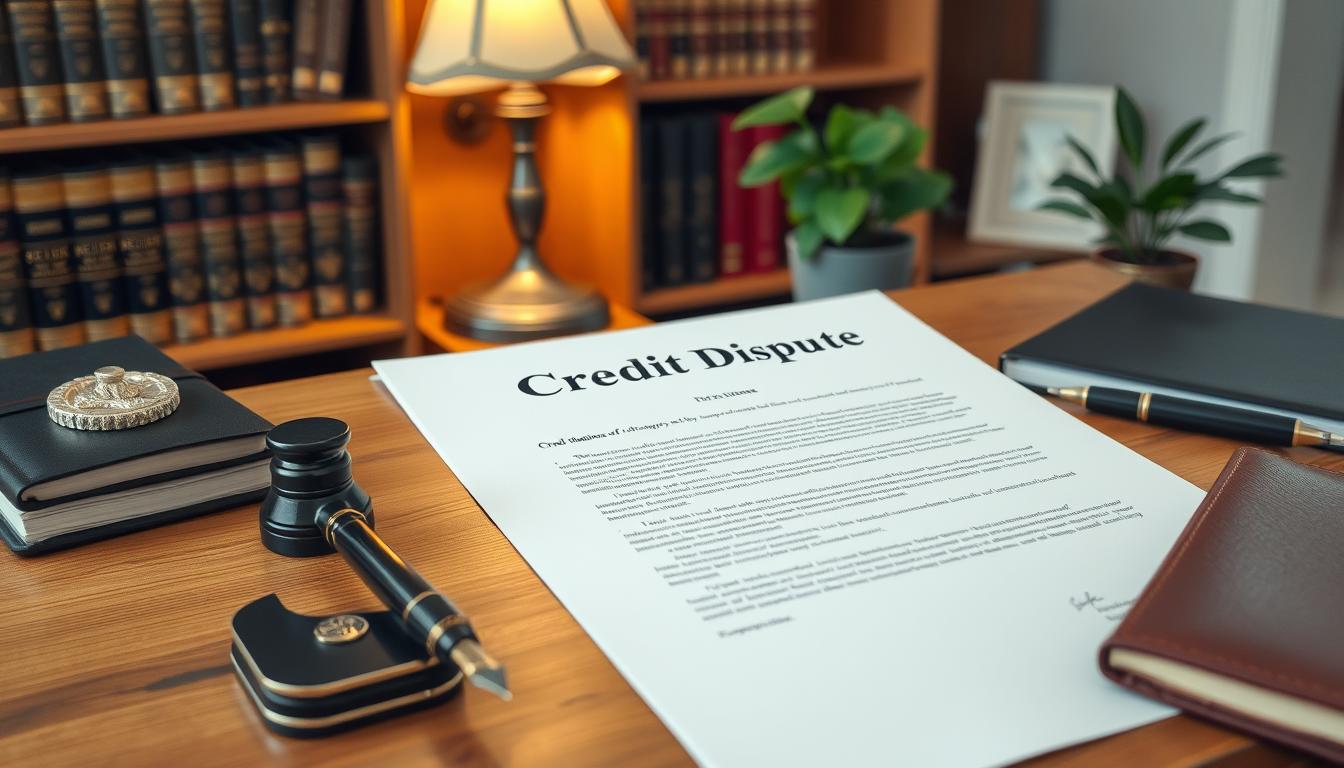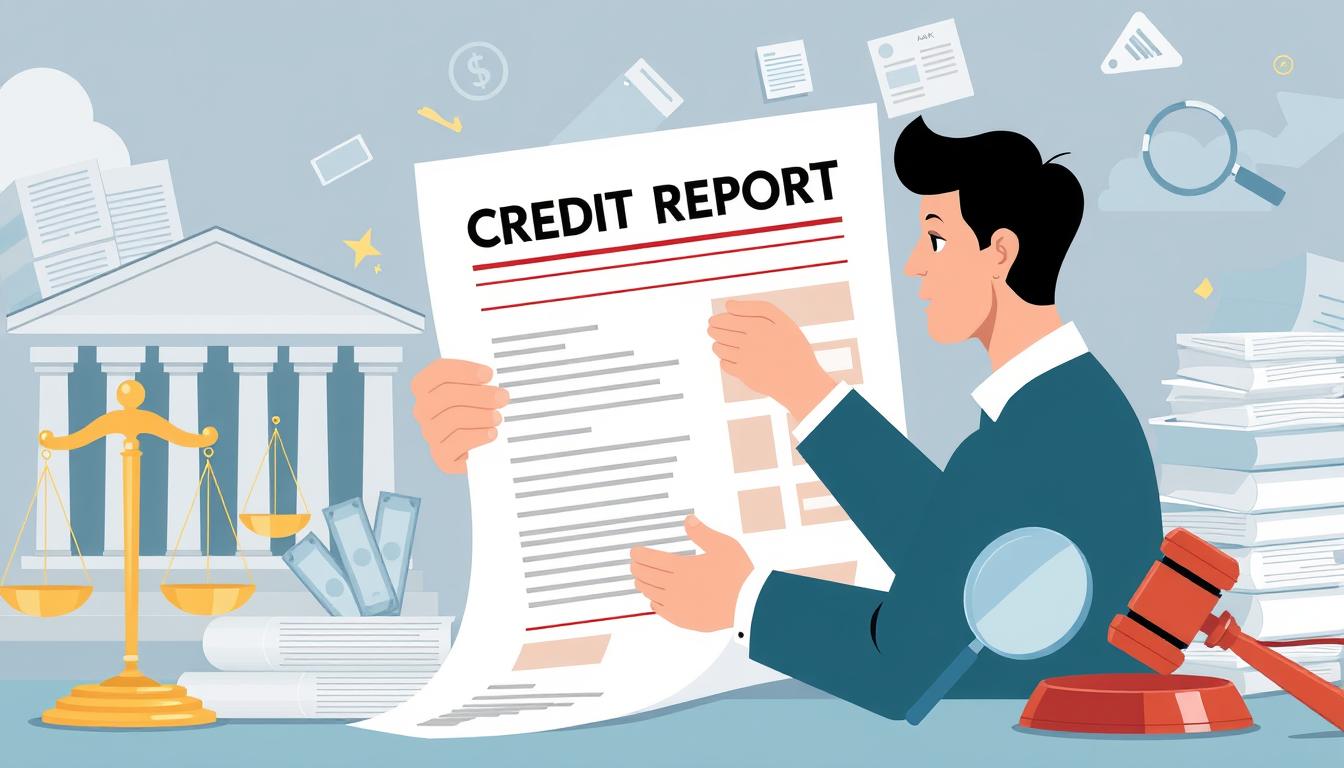Credit report errors can harm your financial health. A lawyer’s expertise is crucial in addressing these issues effectively. They can craft a powerful credit dispute letter to protect your rights.
Legal professionals understand the Fair Credit Reporting Act’s complexities. They use this knowledge to challenge incorrect information on your behalf. Their skills can make a significant difference in resolving credit report inaccuracies.
Key Takeaways
- Understand the significance of addressing credit report errors to maintain a healthy financial standing.
- Recognize the legal expertise a lawyer brings in crafting a credit dispute letter that adheres to the Fair Credit Reporting Act.
- Explore the key elements of an effective credit dispute letter, including identifying inaccuracies and providing supporting evidence.
- Learn about the process of disputing credit report errors and the timelines involved for investigation.
- Discover the consumer rights and legal remedies available when dealing with inaccurate credit information.
The Importance of a Well-Crafted Credit Dispute Letter
Accurate credit information is vital for your financial health. Credit report errors are common and can affect your score, loan eligibility, and finances. These errors range from mistaken identity to incorrect account details and fraud.
Understanding Credit Report Errors
Credit report errors can take various forms, including:
- Mistaken identity: Your credit report may contain information that belongs to someone else with a similar name or Social Security number.
- Incorrect account information: The details of your credit accounts, such as balances, payment history, or status, may be inaccurate.
- Fraudulent activities: Your credit report may include accounts or transactions that you did not authorize.
Consequences of Inaccurate Credit Information
Wrong credit info can harm your financial health. It can lower your credit score, making loans and credit cards harder to get. It might also affect your chances of renting a home or getting a job.
Errors can lead to higher interest rates, making money management tougher. In some cases, credit report errors can result in identity theft, causing more financial troubles.
To protect your rights, address credit report errors quickly. A well-written credit dispute letter can help fix these issues and secure your financial future.
“Maintaining accurate credit information is essential for your financial well-being, as it can directly impact your ability to access credit, secure housing, and even obtain employment.”
The Role of a Lawyer in Credit Dispute Resolution
A lawyer can be crucial in fixing credit report errors. They know complex consumer protection laws, like the Fair Credit Reporting Act. Their legal expertise ensures your rights are protected during credit dispute resolution.
Lawyers understand the Fair Credit Reporting Act and related laws deeply. They can spot credit report mistakes and start effective disputes with creditors and credit bureaus.
- Navigating complex consumer protection laws and regulations
- Effectively communicating with creditors and credit bureaus
- Ensuring timely investigation and resolution of credit report errors
- Protecting your rights under the Fair Credit Reporting Act
A lawyer brings peace of mind to your credit dispute resolution. Their legal expertise helps achieve the best outcome. This is vital when facing unresponsive creditors or tricky credit issues.

Your credit report greatly impacts your financial health. Hiring a lawyer for credit dispute resolution protects your consumer rights. They’ll quickly address any inaccuracies in your report.
Lawyer to Write a Credit Dispute Letter to a Bank
A lawyer’s help is crucial when disputing credit report errors. They know the Fair Credit Reporting Act inside out. Their expertise can boost your chances of removing wrong information from your credit report.
Legal Expertise in Navigating the Fair Credit Reporting Act
The Fair Credit Reporting Act is complex for most people. Lawyers specializing in credit disputes know this law well. They understand agency requirements, timelines, and your legal rights.
A lawyer can craft a credit dispute letter that addresses the core issue. They’ll include necessary documents and clearly state your consumer rights. This expertise can greatly impact your credit dispute with the bank.
“A well-crafted credit dispute letter, backed by the legal expertise of a lawyer, can be the key to successfully removing inaccuracies from your credit report.”
Key Elements of an Effective Credit Dispute Letter
A well-crafted credit dispute letter is vital for success. It’s crucial to pinpoint errors in your credit report. Provide strong evidence to back up your claims.
Identifying Inaccuracies and Supporting Evidence
To make your credit dispute letter effective, focus on these key elements:
- Clearly state the inaccuracies: Outline specific errors in your credit report. These may include wrong account details, payment history, or balances.
- Gather supporting documentation: Collect relevant documents like payment receipts and statements. These can serve as evidence for your dispute.
- Outline the desired resolution: Specify actions you want the bank to take. This could include removing negative items or updating your credit score.
Present a clear and compelling case with detailed evidence. This increases your chances of a successful credit dispute investigation.
Correct inaccuracies on your credit report by providing strong proof. A well-prepared letter can lead to positive outcomes.

“A well-crafted credit dispute letter can be the key to resolving inaccuracies and safeguarding your financial future.”
| Key Element | Description |
|---|---|
| Identifying Inaccuracies | Clearly state the specific errors in your credit report, such as incorrect account details, payment history, or balances. |
| Providing Supporting Evidence | Gather relevant documents like payment receipts, statements, or correspondence to support your dispute. |
| Outlining Desired Resolution | Specify the actions you want the bank to take to correct the inaccuracies, such as removing negative items or updating your credit score. |
Cease and Desist: Preventing Further Damage
Spotting credit report errors causing credit damage? Act fast to shield your finances. A cease and desist letter is your legal ally. With a lawyer’s help, this document can stop banks from reporting wrong info.
This letter serves two key roles: financial protection and safeguarding consumer rights. It demands harmful practices stop, potentially halting negative impacts on your credit score.
Leveraging Legal Expertise
Credit dispute resolution can be tricky. A skilled lawyer can guide you through it. They know the legal ins and outs to help you.
Lawyers can identify specific legal requirements for cease and desist letters. They craft clear messages outlining errors and demanding action. Their expertise ensures the letter is legally binding.
With legal help, you can protect your financial future. You’ll be better equipped to reclaim your consumer rights.
- Identify the specific cease and desist requirements under applicable laws, such as the Fair Credit Reporting Act
- Craft a letter that clearly outlines the inaccuracies and demands immediate action
- Ensure the letter is delivered in a manner that is legally binding and enforceable
- Advise you on further steps if the credit report errors persist despite the cease and desist
“A cease and desist letter can be a powerful tool in stopping the continued reporting of inaccurate information that is damaging your credit.”
The Process of Disputing Credit Report Errors
Credit report errors can be fixed. The Fair Credit Reporting Act (FCRA) outlines the process. Knowing these rules helps consumers fix inaccuracies quickly.
Timelines and Procedures for Investigation
The FCRA sets strict timelines for credit agencies and furnishers. These rules ensure fair and quick dispute resolutions.
- Upon receiving a dispute, the credit reporting agency has 30 days to investigate the claim and provide the results to the consumer.
- If the investigation reveals that the information is inaccurate, the credit reporting agency must promptly correct the error and notify the consumer.
- Furnishers, such as banks, have 30 days to investigate the dispute and report their findings back to the credit reporting agency.
- If the furnisher cannot verify the accuracy of the information, it must notify the credit reporting agency to delete or modify the item.
These timelines protect consumers’ rights. They ensure disputes are handled properly. Quick resolutions help maintain good credit scores.
| Dispute Timeline | Credit Reporting Agency | Furnisher |
|---|---|---|
| Initial Dispute | 30 days to investigate | 30 days to investigate |
| Inaccurate Information | Promptly correct error | Notify credit agency to delete or modify |

The FCRA protects your rights when disputing credit report errors. Understanding these rules helps you manage disputes effectively. Quick resolutions safeguard your credit and financial health.
Consumer Rights and Legal Remedies
Consumers have specific rights to address credit report inaccuracies. The Fair Credit Reporting Act (FCRA) provides protections to ensure accurate credit information. This framework safeguards the integrity of credit reports.
The FCRA allows consumers to dispute errors in their credit reports. Lenders and credit bureaus must investigate these disputes promptly. They are required to correct any verified inaccuracies.
If they fail to do so, consumers can seek legal remedies. These include recovering actual damages, statutory damages, and attorney’s fees.
The FCRA grants consumers free annual credit reports from major credit bureaus. This enables regular monitoring of credit history. Individuals can address issues promptly, maintaining accurate financial information.
Understanding consumer rights is crucial for maintaining accurate credit reports. It helps protect financial well-being. The FCRA’s protections allow consumers to ensure their credit report’s accuracy.
| Consumer Rights | Legal Remedies |
|---|---|
|
|
By understanding their consumer rights and legal remedies, individuals can navigate credit reporting effectively. This knowledge helps safeguard the accuracy of their financial information.
“Maintaining the accuracy of your credit report is crucial for your financial well-being. Leverage your rights under the Fair Credit Reporting Act to dispute errors and protect your financial future.”
Choosing the Right Legal Professional
Picking the right legal professional is vital when disputing credit with a bank. A lawyer’s credentials and experience can greatly impact the outcome. The right expert can help fix credit report errors and protect your consumer rights.
Credentials and Experience in Credit Dispute Matters
Seek a legal professional who specializes in credit disputes. They should have success helping clients with Fair Credit Reporting Act issues.
Consider these factors when choosing a lawyer:
- Educational background – Ensure the lawyer has a law degree from an accredited institution.
- Years of experience – Find a legal professional with ample experience in credit dispute and consumer protection.
- Specialization and certifications – Look for specialized training or certifications in credit dispute resolution.
- Client testimonials and reviews – Read past client feedback to assess the lawyer’s effectiveness and service quality.
Choosing a legal professional with proper credentials and experience boosts your chances of success. They can help dispute credit report errors and safeguard your financial health.

“A skilled legal professional can make all the difference in navigating the complexities of credit dispute resolution and ensuring the protection of your consumer rights.”
Benefits of Professional Legal Writing Services
Crafting an effective credit dispute letter can be complex. Professional legal writers offer many advantages. Their expertise ensures your letter is persuasive, legally sound, and compliant with regulations.
Professional legal writers can craft a compelling and well-structured letter. They understand legal language nuances and effectively communicate your case. Their attention to detail can make a significant difference in dispute resolution.
Legal writing experts know the Fair Credit Reporting Act and other relevant laws. They ensure your letter meets legal requirements. This minimizes delays in the dispute resolution process.
“Using a professional legal writing service for my credit dispute letter was a game-changer. The letter they crafted was so much more effective than anything I could have produced on my own.”
Hiring a professional legal writer allows you to focus on other financial matters. You can be confident your case is handled with care and expertise.
Conclusion
Hiring a lawyer to write your credit dispute letter can be a smart move. They can protect your finances and rights. Legal experts can effectively tackle credit report errors and prevent further damage.
The Fair Credit Reporting Act safeguards consumers. A skilled lawyer can guide you through this complex legal area. They ensure your credit report accurately shows your financial history.
Professional legal help in credit disputes offers long-term benefits. It upholds your rights and restores credit information integrity. This investment can secure a brighter financial future and peace of mind.

